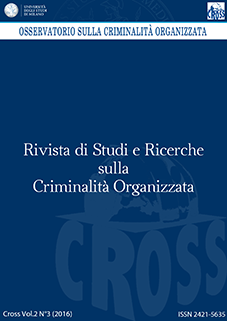The anti-money laundering disciplinary in Germany
DOI:
https://doi.org/10.13130/cross-7793Abstract
This paper contributes to the discussion on the effectiveness of the money laundering offence in tackling the infiltration of illicit financial flows in the licit economy. Despite the practice of concealing proceeds of crime to avoid prosecution dates back long time, the legal concept of money laundering is relatively recent. It has been introduced in criminal laws from the beginning of the 80ies. So far, the scope of the anti-money laundering regime has been expanded. Yet, the regulations are object of a controversial debate due to their incapacity of impeding the reinvestment of ill-gotten gains into the legitimate economy. This work proposes an alternative approach to the question of the effectiveness, on the basis of a national case study.
Keywords: Money laundering - anti-money laundering regime - Germany - effectiveness - illicit financial flows






